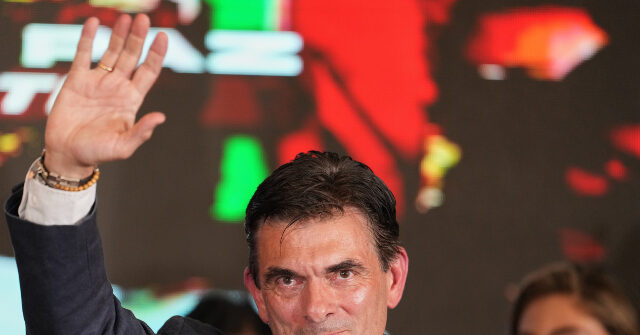Bolivian centrist Senator Rodrigo Paz became the president-elect of Bolivia after defeating conservative former President Jorge Quiroga in Sunday’s runoff election.
Paz will succeed outgoing socialist President Luis Arce on November 8, ending two decades of rule by the Movement Towards Socialism (MAS), at a time when Bolivia faces a dire economic crisis caused by Arce and MAS’s disastrous socialist policies.
Over 6.4 million Bolivians peacefully headed to the polls on Sunday to elect their new president for the next five years. Preliminary results from Bolivia’s electoral authority indicate that Paz obtained 54.5 percent of the votes, with his rival, former President Quiroga, obtaining 45.5 percent of the votes. In total, some 6.5 million votes were cast on Sunday.
“The United States stands ready to partner with Bolivia on shared priorities, including ending illegal immigration, improved market access for bilateral investment, and combating transnational criminal organizations to strengthen regional security,” Secretary of State Marco Rubio said Sunday in a press statement.
Paz, 58, presently serves as a moderate senator in the Christian Democratic Party (PDC), representing the province of Tarija. Paz is the son of former President Jaime Paz Zamora and was born in Spain while his father was in exile. Paz ran as the PDC’s presidential candidate with a centrist platform focused on overturning Bolivia’s dire socialism-caused problems such as shortages of fuel and foreign cash, while promoting “capitalism for all.” Some of his economic proposals include passing policies that include tax incentives for small businesses and the elimination of Bolivia’s National Customs authority. He has vowed to tackle Bolivia’s dire economic crisis without severe spending cuts while maintaining social programs.
The President-elect addressed his followers for roughly 18 minutes after the preliminary results were announced. Paz called for unity among Bolivians amid the “winds of change” for the country, and announced an opening up to the world after 20 years of socialist rule under MAS — a party that suffered a resounding defeat in August’s general elections that reduced its presence in congress to two seats in the Chamber of Deputies and zero Senate seats.
Paz thanked several regional presidents from across the political spectrum that congratulated him over his electoral victory, emphasizing that “Bolivia is gradually regaining its international standing.”
Paz made special mention of U.S. Deputy Secretary of State Christopher Landau, who called him on behalf of the administration of President Donald Trump to pursue a “close relationship with the most important government in the world.”
“The U.S. welcomes the President-elect’s desire to reengage politically and economically, and we both pledged to work closely together to make our countries safer, stronger, and more prosperous. May God bless Rodrigo Paz and the wonderful people of Bolivia,” Deputy State Sec. Landau wrote on social media.
Argentine President Javier Milei was among the regional heads of state who congratulated Paz on Sunday. In a social media post, Milei congratulated Paz and the Bolivian people for their commitment to democracy, and described the election as a historic day for Bolivia, as it leaves 20 years of socialism behind.
“This is a historic day for Bolivia, leaving behind 20 years of the failed model of ’21st-century socialism’ that has done so much damage to our region. Bolivia is reentering the free world, with a course geared toward economic openness, combating corruption and insecurity, and ending the era of government waste,” Milei wrote.
“This democratic day reflects the region’s desire for freedom and progress. I wish the president-elect every success in his administration,” he continued. “Long live liberty, damn it!”
For the past 20 years, first under failed wannabe dictator and now fugitive of the law on pedophilia allegations Evo Morales and then under Luis Arce, MAS aligned Bolivia with the world’s most notorious anti-U.S. regimes such as China, Russia, Iran, Cuba, Nicaragua, and Venezuela. Arce fiercely sought to give away Bolivia’s lithium reserves to Russia and China through dubious and highly condemned contracts whose terms are highly detrimental to Bolivia.
Most alarmingly, Arce seemingly gave Iran free rein to spread its influence in the country, leading experts to denounce Bolivia as Iran’s “most successful” project in the region. Arce met with late Iranian President Ebrahim Raisi in March 2024. Raisi described Arce as his “friend.”
Under Arce, Bolivia and Iran signed a highly controversial memorandum of understanding on defense and security in 2023. The two countries also inked an agreement for the purchase of Iranian-made drones.
The deals immediately raised alarms among Latin America’s democratic governments — most notably in Argentina, a country that suffered two terrorist attacks against Jewish targets in the 1990s committed by Iran through its proxy, the jihadist terror group Hezbollah.
On Sunday, in remarks given during a local live interview, Argentine Security Minister Patricia Bullrich reiterated Argentina’s concern over Bolivia’s deal with Iran and said, citing members of President-elect Paz’s team, that the new Bolivian government is willing to terminate the deal with Iran.
“You know that there is an agreement with Iran, and this new president, or at least some of the people in his potential cabinet who have been talking to us, have said that they would be willing to terminate that agreement with Iran,” Bullrich said, “which would bring a lot of peace and tranquility to Argentina.”
Christian K. Caruzo is a Venezuelan writer and documents life under socialism. You can follow him on Twitter here.
Read the full article here



